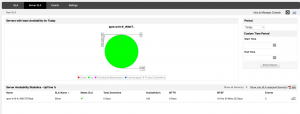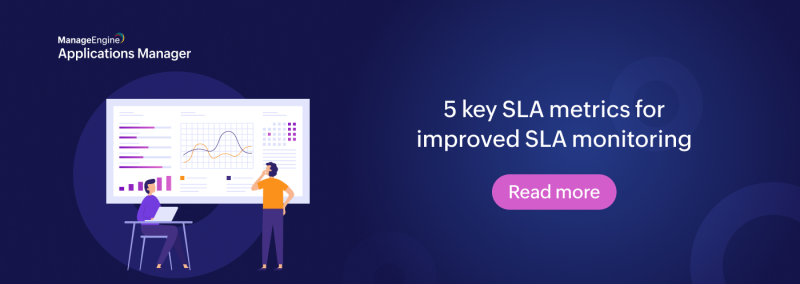Service-level agreements (SLAs) are the essential guarding lines of IT service management. They set clear expectations, ensure consistent performance, and drive accountability. Managing SLAs and scaling them in real time helps organizations enhance service delivery.
Why is SLA management crucial for enterprises?
Managing SLAs helps IT teams ensure their services meet business expectations. It helps admins to track every issue and potential breach, reduce the risk of oversight, and enforce accountability. With proper oversight, admins will be able to ensure that the promised baselines in the SLAs are met.
What happens if SLAs are not managed efficiently?
Loss of trust
When organizations fail to meet agreed performance baselines, it leads to dissatisfaction among end users and tarnishes trust. Organizations that establish SLAs are expected to deliver seamless and reliable service. Violating such agreements can cause mistrust among service providers and recipients.
Loss of revenue
Most SLAs prescribe financial compensation for non-compliant SLAs as penalties. Repeated violations can cause significant financial loss. Also, with prolonged response time and issue fixes, the user experience is bound to be affected. In such cases, organizations are prone to losing brand image and revenue due to delayed business operations and underperforming services.
Operational issues
Poor SLA management can create inefficiencies within the organization, such as overlooked or misdirected escalations or reactive management instead of proactive planning. This disrupts workflows and reduces overall productivity.
Scalability issues
SLAs that are not reviewed or updated regularly fail to align with dynamic business objectives. This occurs when KPI trends look good periodically but fail to deliver quality service to end users.
Real-world examples of SLA failures
You might say, “What could possibly go wrong if an SLA is violated?” Give the following cases a skim:
Slack’s global outage (January 2021)
One of the most prominent communication media among the corporate bodies, Slack, experienced a global outage on Jan. 4, 2021. It disrupted communication among millions of users who were unable to leverage the service for almost five hours. The root cause turned out to be a server scaling issue, which led to service downtime, and an unnoticed SLA violation, affecting the availability of the service globally. This resulted in significant financial and reputational loss. Learn more.
According to Gartner, over 70% of IT service failures stem from mismanaged SLAs or communication breakdowns.
Barclays Bank outage (January 2025)
UK-based multinational banking firm, Barclays, faced a similar but more severe situation than Slack. In January 2025, the banking organization suffered a critical outage that took three whole days to be resolved. This resulted in a major failure in fund transactions at an error rate of over 50%. The outage broke the payment gateways right on the deadline to file self-assessment tax returns, making public outcry worse. Barclays confirmed that it is going to pay over $6.6 million for compensating “distress” due to the service crashes.
Websites, application servers, online banking, and telebanking services were affected by this outage. Users were logged out of their sessions, payments didn’t go through, and funds froze midway overnight. The prolonged mean time to resolve highlighted the need for proactive management instead of reactive approaches. Although Vim Maru, CEO of Barclays UK, stated it was just a software problem, the internet speculated that it could be anything from a mainframe OS configuration issue to a faulty deployment. Given the array of services provided by Barclays and the infrastructure, it could be a broken interdependency or an overlooked escalation. This incident points out how violated SLAs and blind spots in IT infrastructure can cost organizations dearly. Learn more.
Here’s how you can ensure strict SLA compliance with Applications Manager
ManageEngine Applications Manager can be used to manage SLAs by defining service targets, monitoring performance, and reporting on SLA violations.
Define KPIs and establish baselines
Define service-centric KPIs that let you understand the quality of service delivery. Configure thresholds for each metric to alert you of violations at multiple severity levels. This helps you understand overall service performance and highlights anomalies that potentially affect service reliability.

Monitor performance metrics in real time
With Applications Manager’s real-time performance polling, you can monitor your KPI trends in real time. Understanding service performance on the go helps you ensure the uptime and availability of your service.
Proactively monitor SLA performance
Adopt proactive monitoring techniques to monitor your SLAs effectively. Stay ahead of critical violations with Applications Manager’s response automation and performance forecasts. Configure automated responsive actions and alert escalations to resolve anomalies before they lead to critical breaches.

Ensure seamless escalations
When a monitored metric falls outside of the defined SLA parameters, Applications Manager can trigger alerts to notify relevant personnel. Configure email, SMS, and Slack messages to trigger associated teams on under-delivering SLAs and collaborate on solutions to prevent service downtime. You can also integrate Applications Manager with ManageEngine ServiceDesk Plus to streamline the end-to-end service management process. This integration allows for automated ticket creation and escalation when SLAs are violated, further enhancing the efficiency of SLA management.
Scale SLAs efficiently
Update SLAs from time to time to ensure they scale up to customer needs and stay aligned with dynamic business requirements. This eliminates the scope for under-delivery of services and enhances service productivity.
Quickstart SLA management with Applications Manager now!
You can get started on SLA management with Applications Manager in minutes! Try out the tool by downloading and installing our 30-day trial version. Applications Manager offers monitoring support for over 150 technologies like web services, cloud services, middleware, VMs, ERPs, databases, containers, web servers, applications servers, cloud applications, and many more. You will be able to configure SLAs for each service and track uptime on the go.
Need help? Schedule a demo with our experts now!

